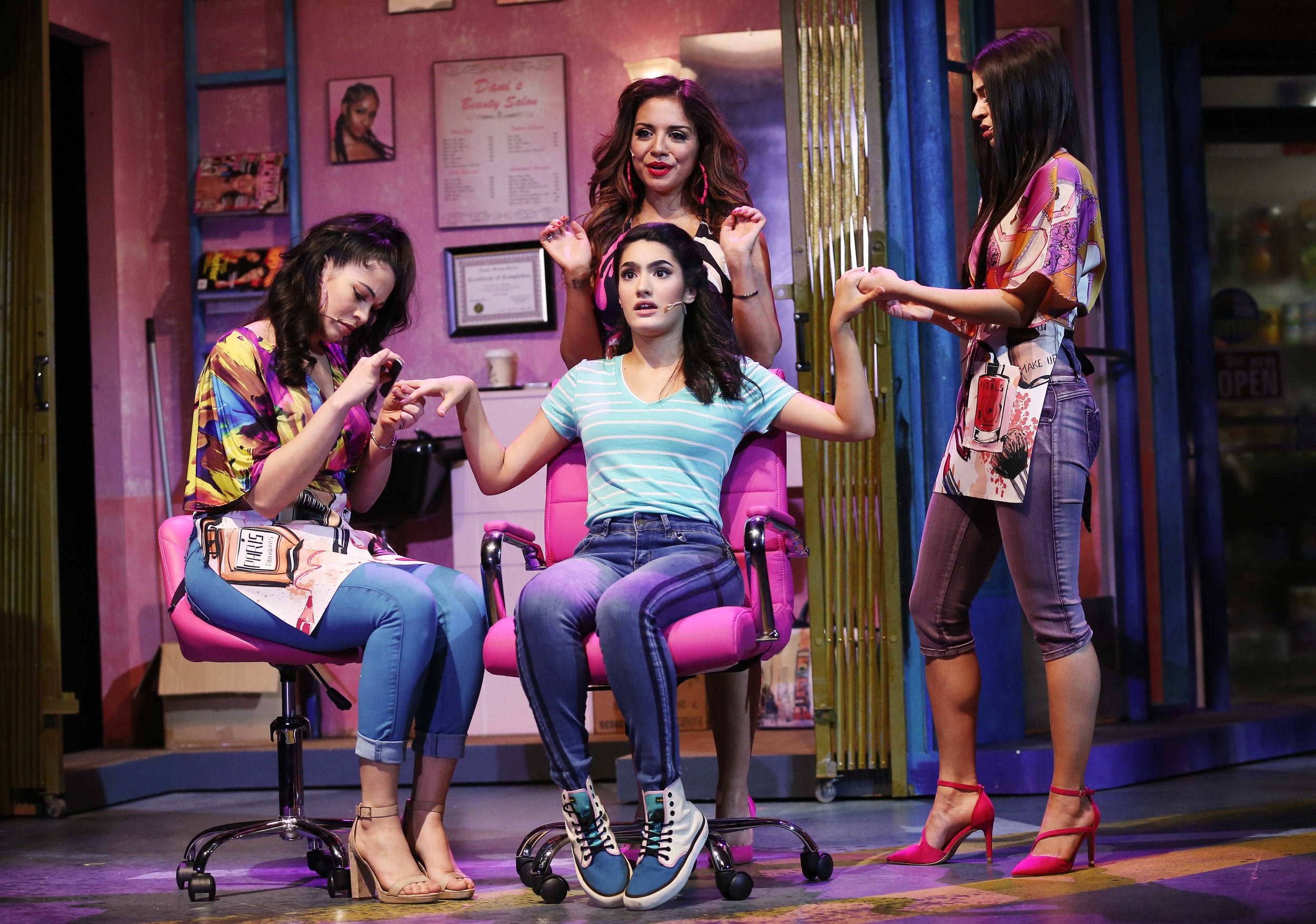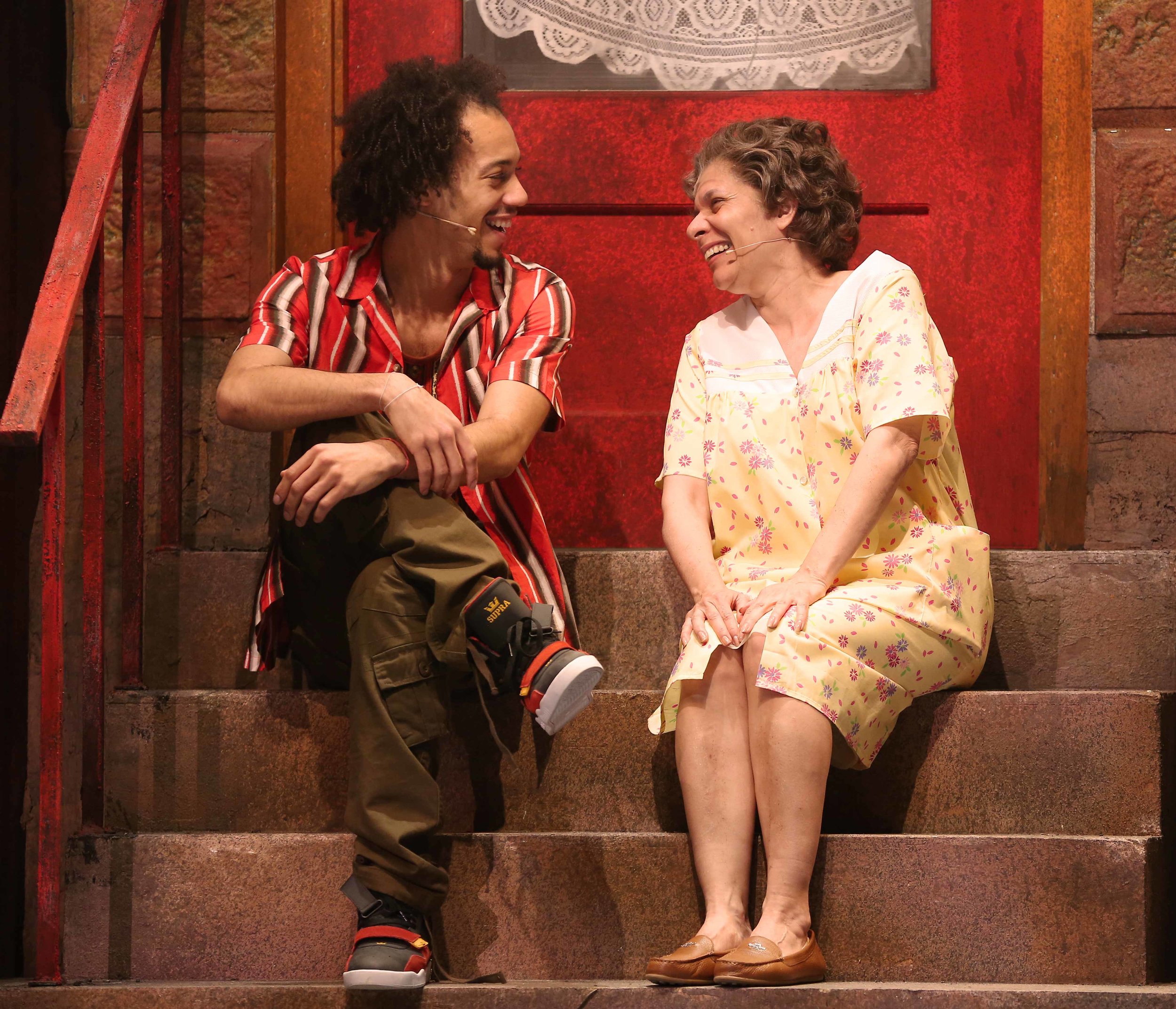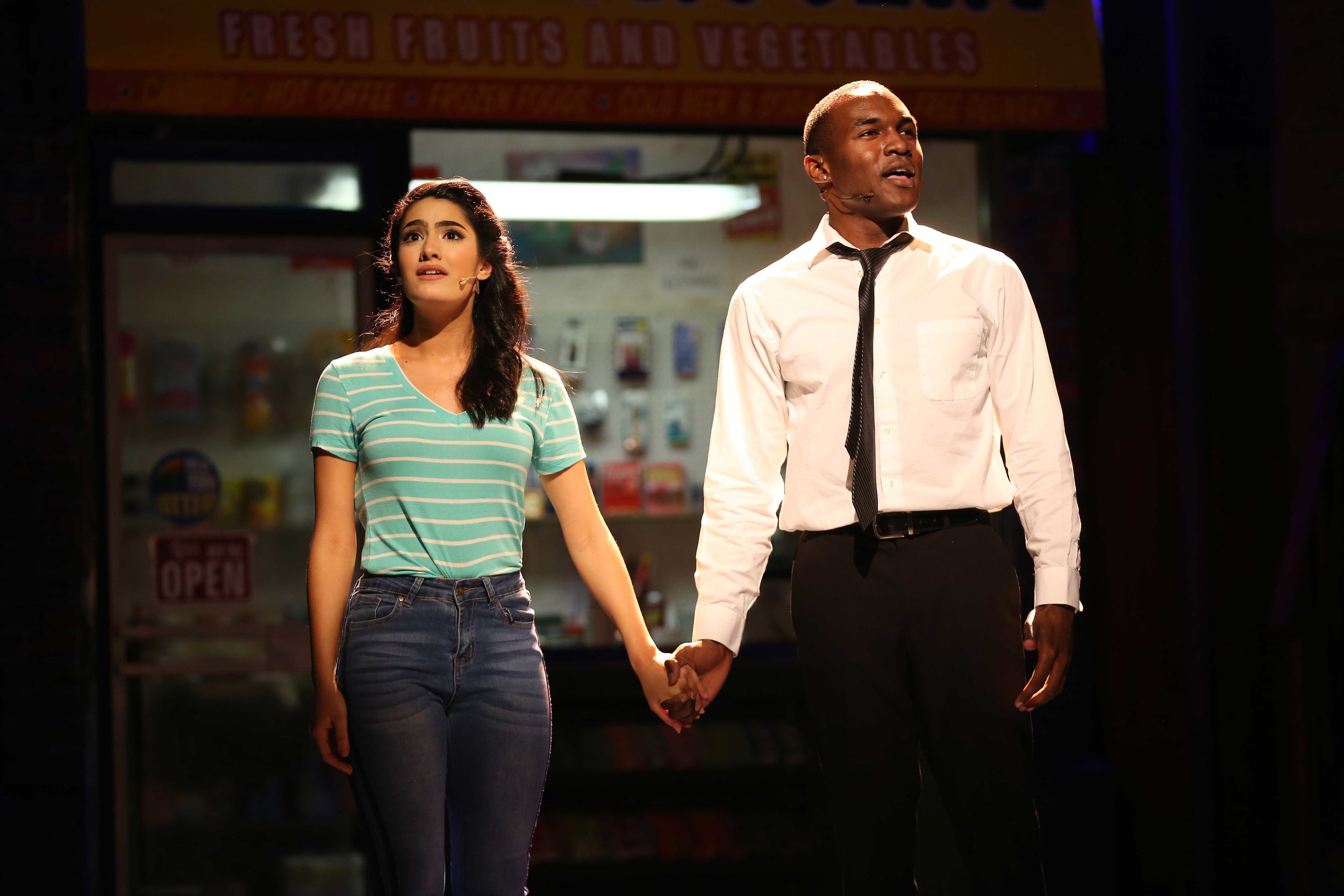Review of In the Heights, Westport Country Playhouse
Westport Country Playhouse opens its 2019 season with a crowd-pleaser. In the Heights by Lin-Manuel Miranda and Quiara Alegría Hudes, directed and choreographed by Marcos Santana, is a lively look back at a certain time and place, full of the kind of evocative nostalgia that becomes the stuff of myth—or of musicals.
We may be forgiven for looking back at the 1990s as a more innocent time. Set in July 1999, when an eighteen-hour blackout hit Washington Heights, where the action takes place, the musical evokes the summer heat and the way a neighborhood meets its daily challenges. There are many subplots—some are romantic, some economic, but most have to do with proving oneself and with learning to meet new challenges.
Nina (Didi Romero), Benny (Gerald Caesar), Graffitti Pete (Edward Cuellar), Usnavi (Rodolfo Soto), Piragua Guy (Paul Aguirre), Sonny (Ezequiel Pujols), Ensemble (Randy Castillo), Vanessa (Nina Victoria Negron), and Ensemble (Sarita Colon) in Westport Country Playhouse’s production of In the Heights (photo by Carol Rosegg)
At the center of it all is Usnavi, an outgoing bodega owner, played with eager energy by Rodolfo Soto. His rapping intro to the barrio in the show’s title song is matched by many moving bodies, becomingly clad in Fabian Fidel Aguilar’s eye-catching costumes, and parading in Santana’s dance moves across the atmospheric set by Adam Koch. We’re off to a vivid start.
Carla (Amanda Robles), Daniela (Sandra Marante), Nina (Didi Romero), and Vanessa (Nina Victoria Negron) (photo by Carol Rosegg)
At the heart of the story is Nina, played with delicate grace by Didi Romero; she’s the girl who made good by earning a scholarship to Stanford, now she’s back with a secret and finds a budding romance with Benny (Gerald Caesar), a worker at her father’s cabstand. Romero brings a lyrical sweetness to her numbers, “Breathe” and “Everything I Know,” and to her duets with Benny that book-end Act 2, “Sunrise” and “When the Sun Goes Down.” Nina’s parents, Kevin (Tony Chiroldes) and Camila (Doreen Montalvo), each get a standout number in Act 1 and Act 2, respectively. For Chiroldes, it’s Kevin’s melancholy “Inútil (Useless),” a theme song for fathers everywhere, and for Montalvo it’s “Enough,” Camila’s theme song for mothers tired of family bickering.
Miranda has a knack for putting the stuff of everyday life into pithy song, and he makes sure there’s a place in the show for all aspects of the neighborhood he’s at pains to depict. “Pacienca y Fe (Patience and Faith),” sung by the neighborhood’s “abuela” Claudia (Blanca Camacho, perfectly cast) is in many ways the theme song for the neighborhood’s mix of immigrants and their descendants from the Dominican Republic, Puerto Rico, Cuba and elsewhere. One of the most touching moments comes early in Act 2 when Usnavi and Claudia join in acknowledging the “Hundreds of Stories” in the barrio.
Usnavi (Rodolfo Soto), Abuela Claudia (Blanca Camacho) (photo: Carol Rosegg)
There’s also a big club number, which lets the kids dress up, to close out Act 1, followed by some violence and chaos during the blackout, and even a willful celebration of Carnaval, led by Daniela (Sandra Marante), who also encapsulates gossip as a lingua franca at her hair salon, with “No Me Diga.” The dances are led by Alison Solomon and make the most of Westport’s wide, deep stage. Domonic Sack’s soundstage, however, seems not quite up to the challenge of Westport’s barnlike space as some of the voices don’t come across with the requisite precision in the mix.
Santana, who choreographed Westport’s Man of La Mancha last season, here gets to take on a more upbeat musical. In the Heights lacks any darker dramatic tension, comprised of the kind of everyday challenges that only glance at issues of racism and the need for political action. Miranda and Alegría Hudes prefer to make the show a love letter to the barrio with the kind of united front common to sit-coms and Disney musicals. Usnavi, as the role Miranda originated, keeps a positive focus and Soto imbues him with a wide-eyed hope that makes him decide that his ticket out can just as easily be a reason to stay.
In the Heights is nothing if not celebratory, giving to an area previously depicted primarily in terms of gangs, crime and drugs a feel for its joy and strong ties—encapsulated by the moving “Everything I Know,” where moving on and taking the past along is key to the immigrants’ experience, handed down as legacy for the young and beautiful inhabitants in the heights.
Nina (Didi Romero), Benny (Gerald Caesar) (photo: Carol Rosegg)
In the Heights
Music and Lyrics by Lin-Manuel Miranda
Book by Quiara Alegría Hudes
Directed and choreographed by Marcos Santana
Scenic Design: Adam Koch; Costume Design: Fabian Fidel Aguilar; Lighting Design: María-Cristina Fusté; Sound Design: Domonic Sack; Music Director: Daniel Green; Associate Choreographer: Alison Solomon; Props Master: Alison Mantilla; Production Stage Manager: Jason Brouillard
Musicians: Aron Caceres, bass; Ernie Fortunato, guitar; Alex Giosa, drums; Daniel Green, keyboard; Christopher Gurr, keyboard II; Simon Hutchings, reeds; Chris Rinaman, trombone; Les Rogers, trumpet; Arei Sekiguchi, percussion
Cast: Paul Aguirre, Gerald Caesar, Blanca Camacho, Randy Castillo, Tony Chiroldes, Sarita Colon, Edward Cuellar, Jonté Jaurel Culpeppr, Melissa Denise Lopez, Sandra Marante, Doreen Montalvo, Nina Victoria Negron, Ezequiel Pujols, Amanda Robles, Didi Romero, Marco Antonio Santiago, Alison Solomon, Rodolfo Soto
Westport Country Playhouse
April 23-May 19, 2019












